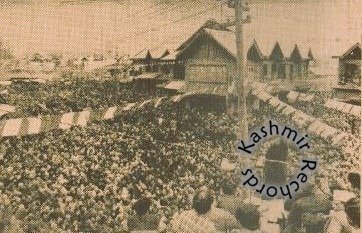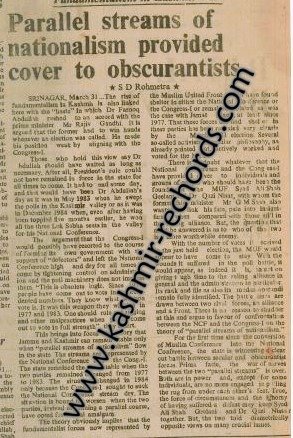In 1987 Elections, the MUF campaigned on a platform that promoted Islamic governance through “Nizam-e-Mustafa” (Islamic Rule), which presented a significant dilemma for the Indian government. The prospect of the MUF coming to power was seen as a direct threat to the State, and had MUF succeeded, it could have radically altered the political landscape of Kashmir.
(Kashmir Rechords Exclusive)
The 1987 Jammu and Kashmir Assembly election is often seen as a watershed moment in the region’s history. Widely believed to be a turning point, the election is frequently cited as the moment when militancy in Kashmir was born, driven by widespread allegations of electoral rigging. These allegations remain a powerful reminder of the events that set the stage for Kashmir’s prolonged conflict.
Allegations of Rigging and Political Fallout
For years, separatist groups have accused both the Government of India and the State of manipulating the election results. Ironically, these claims of electoral malpractice have now been echoed by even “national political parties” in more recent times, but often for self-serving purposes. These accusations, now resurfacing during Jammu and Kashmir’s first elections since its reduction to Union Territory status, are being used to discredit the regional political figures from that era.
The Rise of the Muslim United Front
The 1987 elections saw the emergence of the Muslim United Front (MUF), a formidable political coalition that challenged the existing order. The MUF campaigned on a platform that promoted Islamic governance through “Nizam-e-Mustafa” (Islamic Rule), which presented a significant dilemma for the Indian government. The prospect of the MUF coming to power was seen as a direct threat to the State, and had MUF succeeded, it could have radically altered the political landscape of Kashmir.

The Political Landscape of 1987
Veteran journalist S.D. Rohmetra, founder of Daily Excelsior, had foreseen the rise of the MUF and warned about its growing influence. The MUF made significant gains in regions traditionally controlled by the National Conference (NC), signalling a potential shift in political dominance. Although ultimately defeated, the MUF’s strong showing in areas like Sopore, where Syed Ali Shah Geelani defeated NC’s Abdul Ahad Vakil by over 4,000 votes, sent shockwaves through the political establishment. MUF also secured substantial votes in urban constituencies like Amirakadal and Zadibal, both NC strongholds.
Rigging Allegations
The rigging accusations surrounding the 1987 election are still debated today. Many believe that the Indian government saw an MUF victory as a destabilizing force that would have shifted the balance of power towards more radical, religious politics. To avoid this, attempts were allegedly made to ensure that the MUF was kept out of power, even if it meant manipulating the results. This perceived injustice contributed significantly to the sense of political disenfranchisement among many Kashmiris, laying the foundation for future unrest.

The Aftermath: The Rise of Militancy
The defeat of the MUF in the 1987 election was not the end of its political story. Many MUF leaders had already devised an alternative plan—Plan B—in case they were unable to secure power through the democratic process. After their defeat, several leaders crossed into Pakistan and Pakistan-occupied Kashmir (PoK), where they received arms training. Upon their return, they initiated the insurgency that has since engulfed Kashmir in violence, a conflict that has endured for nearly four decades.
The disenfranchisement born out of the 1987 elections, coupled with the rise of radical elements within Kashmir, provided fertile ground for external influences, particularly from Pakistan. As MUF leaders took refuge and trained in PoK, they found logistical and military support to launch an armed uprising against the Indian State. This insurgency has claimed thousands of lives and left behind a legacy of bitterness, violence, and instability. Meanwhile, some nationalist political parties in India have reignited the debate over the 1987 election rigging for their electoral gain, often overlooking the long-term consequences of such rhetoric.
A Legacy of Fragile Politics
The 1987 Jammu and Kashmir elections remain a stark reminder of how fragile political institutions can be when trust in democratic processes is eroded. Whether the allegations of rigging are true or exaggerated, the perception of injustice fostered widespread disillusionment and led to the violent insurgency that continues to plague the region. For about 40 years, the people of Jammu and Kashmir have borne the brunt of this turmoil, as political, religious, and nationalistic forces continue to vie for control.
The legacy of the 1987 elections is more than just political—it is a deeply ingrained part of Kashmir’s social and cultural history. As Jammu and Kashmir moves forward, particularly as a Union Territory, the lessons from 1987 should not be forgotten. The future stability of the region depends on ensuring that history does not repeat itself, and that democratic institutions are strengthened to secure lasting peace and stability.